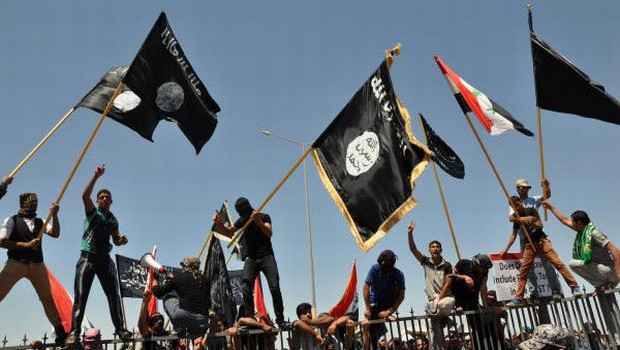
Masked Sunni protesters wave Islamist flags while others chant slogans at an anti-government rally in Fallujah, Iraq, Friday, April 26, 2013 (AP Photo)
Baghdad, Asharq Al-Awsat—Tensions continued to escalate in Iraq yesterday even after the embattled Baghdad government welcomed the appointment of an official representative to negotiate on behalf of the protesters.
In the city of central city of Samarra, Sheikh Muhammad Taha Al-Hamdoun, called on Iraqi Prime Minister Nuri Al-Maliki to step down, threatening to establish an independent Sunni region if he refuses to do so.
Similar demands were repeated in Mosul, where the imam of the Al-Nabi Shayth mosque called for the establishment of a Sunni region in western Iraq following the government’s failure to respond to the protestors’ legitimate demands.
In Fallujah, calls for the establishment of an independent Sunni region were met with public indignation. Protestors in a public square attacked a preacher, after he called for secession from the central state.
Speaking exclusively to Asharq Al-Awsat, Fallujah protest leader Sheikh Khaled Al-Jamili, revealed, “No sooner had the preacher mentioned the issue of [establishing] a Sunni state than the protestors threw bottles of water at him.”
“The majority of Iraqis reject the idea of partitioning Iraq into [separate] regions,” he added.
Despite the apparent escalation in the protesters rhetoric, Baghdad welcomed the decision reached by the protesters nation-wide to appoint a single figure to negotiate directly with the government.
Iraqi Mufti Abdul Malik Al-Saadi. was appointed by protesters in six Iraqi governorates to head negotiations with the Maliki regime. He is the top-ranking Sunni authority in the country.
“The government welcomes any person the protestors nominate to hold negotiations with us,” Maryam Al-Rayes, a political advisor in Al-Maliki’s office, told Asharq Al-Awsat.
Al-Rayes added, “We must differentiate between two things: on the one hand, the political agendas and goals adopted by some politicians who want to pervert the course of protests; on the other, there are the demands that concern services and the government’s performance which are not limited to the western provinces but also include the central and northern provinces.”
Despite the strict security measures in Baghdad, a number of attacks took place across the Iraqi capital yesterday targeting both Sunni mosques and Shi’ite shrines, resulting in several people being killed, and more than 70 injured.
Sunni Sheikh Mahdi al-Sumaidaie, a member of the conservative Islamist Sunni Muslim Scholars Association, told Asharq Al-Awsat that “the targeting of places of worship is simultaneously unfortunate and dangerous. This will undermine moderation and replace affection with hatred and malice.”
“I call on all Iraqi politicians and security forces to show caution,” he added.
On Saturday, Human Rights Watch (HRW), urged Baghdad to give a government committee tasked with investigating the deadly Hawijah raid greater financial and political backing.
HRW Middle East Director, Sarah Leah Whiston, emphasized: “The people of Iraq aren’t going to be fooled by a Potemkin inquiry into the killings at Hawijah.”
She said: “As the country teeters on the brink of further violence, the government is wasting a critical opportunity to restore confidence in its ability to achieve justice for the civilians and security forces who died on April 23.”
